By: Sam LaGrone
January 15, 2021 7:06 PM
Rendering of USS Constellation (FFG-62). Fincantieri Image
The first hull in a new Navy ship class in more than a decade is set to start construction later this year, the service’s program manager said this week.
Fincantieri Marinette Marine plans to start fabrication of the future USS Constellation (FFG-62) in late summer or early fall following the completion of the final design review of the plans for the ship, Capt. Kevin Smith, who oversees the program for the Navy, said on Tuesday. The ship is estimated to be completed in Fiscal Year 2026.
“After we awarded the contract in April, we got going on functional design, the detailed design, with Fincantieri, Smith said.
“We had an initial delivery of the build specifications that were worked in during the conceptual design phase. Those are still being refined as we get ready for a critical design review later this fall.”
The Navy has stressed the multi-mission character of the new class rather than the modular mission package system of the Littoral Combat Ship. Estimated to displace about 7,300 tons fully loaded, the Connies will feature a derivative of the AN/SPY-6 radar being installed on the Flight III Arleigh Burke-class guided-missile destroyers, a 32-cell vertical launch system, Aegis Baseline 10 combat system and 16 anti-ship Naval Strike Missiles, with a crew of about 200.
The design of the new frigate is based on the FREMM multi-mission frigate in use with the French and Italian navies. Even with using the FREMM as a parent design, the Navy and designers Gibbs & Cox are making extensive revisions to accommodate not only American survivability standards, but also the margins the ship will need to accommodate new weapons and sensors over the life of the hull.
“Right now, the vast majority of the work going on for frigate is the detailed design. The engineers are sitting down and doing drawings,” Fincantieri Marinette Marine president and former U.S. Surface Force Pacific commander Rick Hunt told reporters in December.
In terms of margin, the hull should be able to add another 500 tons of weight and have excess cooling and electricity capacity for new equipment, Hunt said.
Fincantieri Image via Naval News
Smith acknowledged the room for the platform to grow over the life of the class.
“We have ample margin for this hull form. We also have in our requirements [the] space, weight, power and cooling margin to accommodate upgrades down the road over the service life of the ship,” he said.
“Some of those could lead to direct energy type projects and other capabilities.”
Fincantieri and the Navy are also working under a congressional mandate to ensure the components in the class, based on an Italian design, are all American.
“This is a U.S. warship that’s 96 percent American products right now in the design that we produce. We’ve touched almost every drawing from the parent design,” Hunt said.
“By the time we complete ship two, we’ll be at a hundred percent American.”
The Navy is estimating the first-in-class Constellation is set to cost about $1.28 billion — $795 million for the hull and the rest for government-furnished equipment, Smith said. The follow-on ships must have a price range of $800 to $950 million. Smith said that current cost estimates for the follow-on hulls to the first ship were around $781 million per ship — about $8.7 billion for the first ten ships.
In October, the Congressional Budget Office said the Navy might have underestimated the cost by up to 40 percent and the cost could be as high as $12.3 billion for the first ten frigates.
The start of fabrication comes as the yard in Wisconsin is in the midst of a $200 million capital expansion to accommodate the construction of the frigate program that will include a syncrolift, which will lower ships into the water more gently than the side-launch method Marinette Marine uses for the Freedom-class Littoral Combat Ships.
“We’re also putting together a new erection building — final assembly building — large enough to handle two frigates at a time,” Hunt said.
“That’s huge for being able to deliver and complete the ship for the right cost in the right timeframe.”



